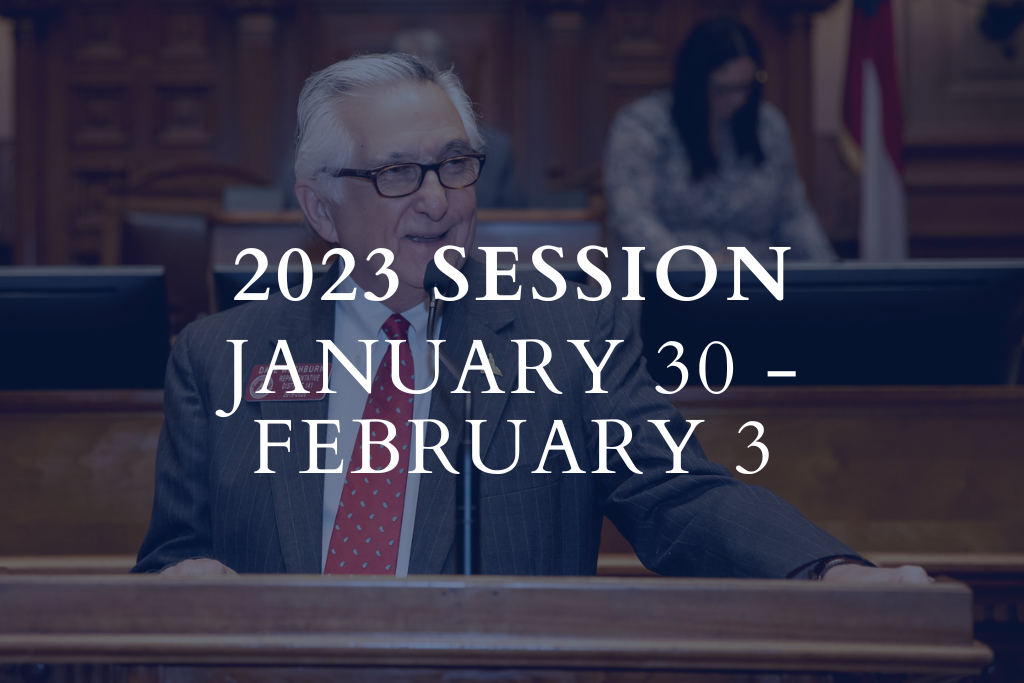Monday, January 30, marked the start of the fourth week of the 2023 legislative session. This fast-paced week brought about significant progress as several House committees met throughout the week to consider legislation, including the House Rules Committee, which determines what bills should be debated and voted on the House floor once bills have passed out of their respective committees. The House also convened for another four legislative days in the House Chamber this week, and before our week was over, we voted on our first bill of the session: the Amended Fiscal Year 2023 state budget.
Each session, the Georgia General Assembly is constitutionally required to pass a balanced state budget, and on Thursday, we passed House Bill 18, or the Amended Fiscal Year (AFY) 2023 budget. During the 2022 legislative session, the legislature passed the original Fiscal Year 2023 budget, which went into effect last July and set state spending at $30.2 billion based on projected revenue estimates. Now, my colleagues and I must also pass an amended state budget based on the actual revenue obtained to fund our state operations through the end of the fiscal year in June. Due to revenue collections being higher than expected, the AFY 2023 budget recognizes approximately $2.36 billion in additional revenue, or 7.8 percent more than the initial FY 2023 budget, and brings the total appropriation for the AFY 2023 budget to $32.56 billion. This is the second year in a row that the state has experienced such a large growth in revenue for an amended budget, and with this increase in funding, the House was able to provide additional one-time investments to keep Georgians safe, healthy and prosperous over this coming year.
First, the House’s version of the AFY 2023 budget recognizes many of the governor’s recommendations to support economic and workforce development initiatives throughout the state. Under HB 18, the Georgia Department of Community Affairs would receive $166.7 million to help launch large economic development projects, including the new Rivian and Hyundai manufacturing facilities. Our higher education institutions that train and produce future workers for our top job producing industries would also benefit from the House’s AFY 2023 budget. The AFY 2023 budget includes $6.25 million for the Technical College System of Georgia to design a new electric vehicle training center in Newton County, $56.2 million to finish building the new electric vehicle Quick Start training center in Bryan County and $10.6 million to support an existing training center in the Chatham County area. To address the major demand for pilots and other aviation workers, the Middle Georgia State University Aviation Program would receive $5.7 million this year to purchase aircraft and construct t-hangers that are needed to expand the program. For our workforce housing needs, HB 18 repurposes $35.7 million in existing grant funding to establish the Rural Workforce Housing Fund; this program would help local authorities bring new affordable housing developments to rural areas. Finally, the Savannah Logistics Innovation Center would receive $650,000 to support the logistics and supply chain industry to keep up with the growing demand near our state’s largest port.
Georgia’s K-12 education system also receives special attention in the House’s version of the AFY 2023 budget. HB 18 includes $128.2 million for the Quality Basic Education formula’s midterm adjustment to meet the education needs of 12,939 new students, account for charter system growth and expand the Special Needs Scholarship. The governor recently announced his plans to dedicate $50,000 per school in one-time grant funding to allow every public school to make security improvements, and the House’s amended budget includes even more funding to bring the total for these security grants to $60,000 per school. This budget also supports our K-12 teacher workforce pipeline by including $5 million in grant funding to encourage paraprofessionals with bachelor’s degrees to become certified teachers; these grants would be offered to soon-to-be teachers enrolled in a certification program after January 1, 2023. HB 18 would also allow for schools to apply for $50,000 in matching funds to implement character education programming, which would ensure that our students have more well-rounded interpersonal skills.
The House’s budget would also allow the state to provide more support to the employer portion of the State Health Benefit Plan (SHBP) for teachers and school employees. To adjust for the rising costs of health care, this budget increases the SHBP monthly employer match for certified employees from $945 to $1,580 starting this year, totaling $424.8 million in this budget. For the first time since the Great Recession, this budget also includes funding for the employer cost for the SHBP plan for non-certified school employees, which has previously been paid using only local school system’s budgets. To that end, the House allocated $100 million to reflect a three-year phase-in for the employer contribution for non-certified school employees starting in January 2024. These two funding initiatives would ease the financial burden of school systems for both certified and non-certified employee health plans.
Additionally, the House’s AFY 2023 budget dedicates state funding towards organizations and programs that provide critical health care services to Georgians, including services to support our vulnerable and at-risk populations. Georgia’s only public teaching hospital, the Medical College of Georgia Hospitals and Clinics, would receive $105 million to implement a new electronic medical record system; this major upgrade would enable doctors to electronically prescribe medications, improve communication with other health systems, allow patients to access their medical records, enhance telehealth services and streamline insurance billing and revenue collection. This budget also includes $2 million to support private psychiatric contract beds so adults struggling with severe mental health issues can receive the care they need, as well as $1.97 million to open offline psychiatric beds at the state’s Georgia Regional Hospital in Atlanta. Furthermore, the Georgia Department of Human Services would receive $5 million to help find alternative housing for youth in our foster care system who have complex needs, and this budget would also provide $825,000 to coordinate outreach to address homelessness in the Atlanta area. Finally, the House’s amended budget allocates $250.8 million for the state’s Medicaid program, which has experienced an increase in enrollment during the pandemic.
The AFY 2023 budget also sets aside funding to address several public safety initiatives. HB 18 includes $2.4 million to improve security at domestic violence shelters located in nearly 50 cities across the state. These vital shelters could spend these funds on safety training for staff, agency safety assessments or upgrades on security systems, privacy fences, bulletproof windows and more. Another $2 million in one-time funds is also included in this budget for these domestic violence shelters to offset the loss of federal grant funds. Next, HB 18 includes $4 million in new funding for the Criminal Justice Coordinating Council’s Georgia Crime Victims Emergency Fund, which provides up to $25,000 in compensation to support victims of violent crime. The governor’s AFY 2023 budget proposal includes $51 million to address emergency maintenance and repairs on the state’s correctional facilities and prisons, and the House’s version of the amended budget supports the governor’s recommendation and adds another $5 million to support these efforts.
Other highlights in the House’s AFY 2023 budget include $1 billion for the governor’s new Homeowner Tax Relief Grant program, which would provide one-time property tax relief for qualifying homesteads for the tax year beginning January 1, 2023. This budget also reflects the need to take care of our retired state employees who dedicated their careers to serving the state by including $14.5 million for a one-time benefit adjustment for retired state employees. Lastly, this budget includes funding to ensure future elections continue to run smoothly and efficiently. The Secretary of State’s Office would receive nearly $5 million to maintain our voting equipment and make improvements to the Georgia Online Voter Registration system.
During Legislative Day 11, my House colleagues and I also took time to recognize the 49th anniversary of the Consulate-General of Japan in Atlanta. Our relationship with Japan has produced nearly $8 billion in imports and exports, and nearly 600 Japanese-affiliated companies employ more than 40,000 Georgians in our state. Consul General Mio Maeda joined us in the House Chamber to celebrate this strategic partnership between our governments, and he noted that our relationship is not limited to economics. Nearly 1,000 Georgia public school students are studying the Japanese language, eight Georgia colleges have Japanese language programs, and 534 Georgians have participated in Japan’s Japanese Exchange and Teaching program since 1987. We enjoyed the consul general and his colleagues’ visit to the Capitol this week, and I commend their efforts to strengthen cultural, educational, political and economic ties between Georgia and Japan.
In other news, the House Page Program resumed at the State Capitol this week following a three-year hiatus due to the public health emergency. For more than 50 years, the Page Program has provided an exclusive opportunity for Georgia’s students between 12 and 18 years old to visit our Capitol and serve in the House Chamber. The experience of a legislative page has also sparked many political aspirations and has been a connective link between elected leaders and young students. This program is highly competitive, and I encourage students from House District 144 who may be interested to apply as soon as possible. Parents and students can learn more about the application process here: https://www.legis.ga.gov/house/page-program.
The House will reconvene on Monday, February 6, for Legislative Day 13, and my colleagues and I will be busier by the day as the session progresses. Now that the AFY 2023 budget has passed in the House, this legislation will undergo the same consideration process in the Senate, and the House will shift its focus towards creating a full budget for the upcoming fiscal year. We will also continue to see many more bills reach the House floor in the days and weeks ahead, and I encourage you to reach out to me about any legislation that interests you. My Capitol office phone number is 404-656-0152, and my email address is dale.washburn@house.ga.gov.
As always, thank you for allowing me to serve as your state representative.


Recent Comments